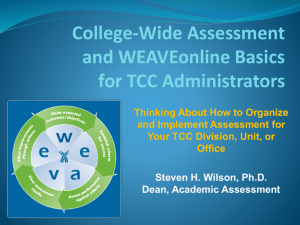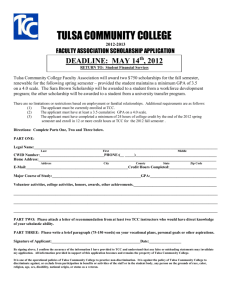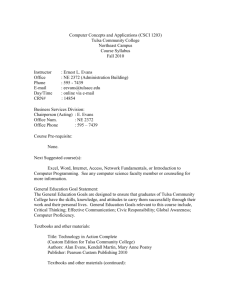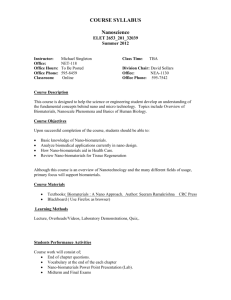new window - Blackboard - Tulsa Community College
advertisement
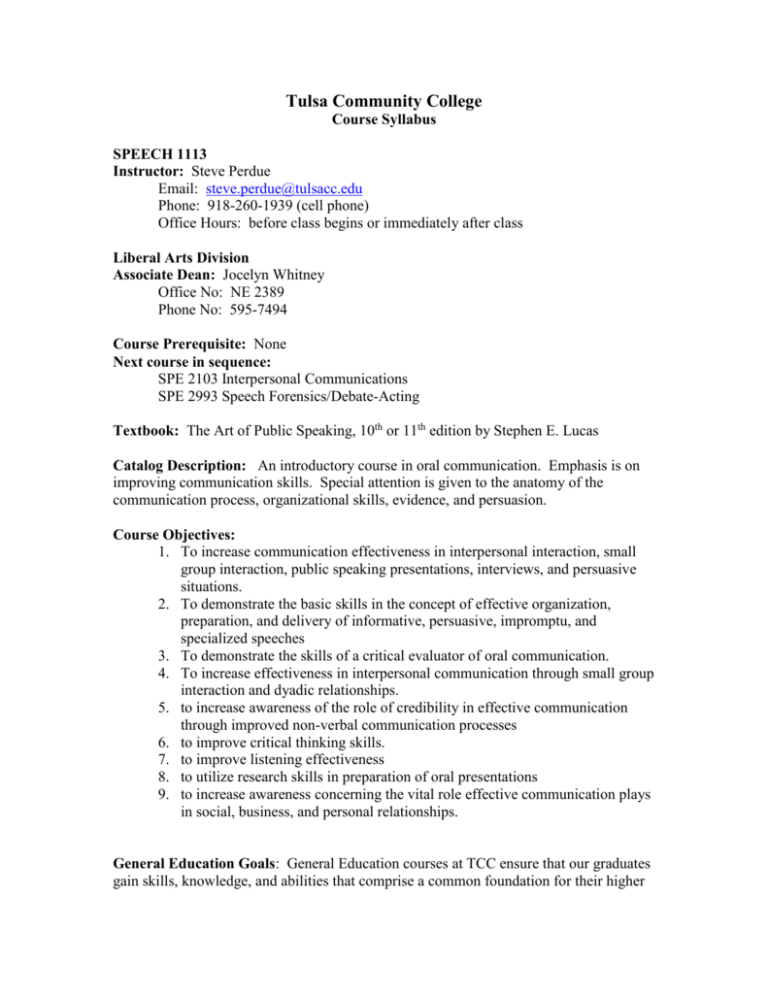
Tulsa Community College
Course Syllabus
SPEECH 1113
Instructor: Steve Perdue
Email: steve.perdue@tulsacc.edu
Phone: 918-260-1939 (cell phone)
Office Hours: before class begins or immediately after class
Liberal Arts Division
Associate Dean: Jocelyn Whitney
Office No: NE 2389
Phone No: 595-7494
Course Prerequisite: None
Next course in sequence:
SPE 2103 Interpersonal Communications
SPE 2993 Speech Forensics/Debate-Acting
Textbook: The Art of Public Speaking, 10th or 11th edition by Stephen E. Lucas
Catalog Description: An introductory course in oral communication. Emphasis is on
improving communication skills. Special attention is given to the anatomy of the
communication process, organizational skills, evidence, and persuasion.
Course Objectives:
1. To increase communication effectiveness in interpersonal interaction, small
group interaction, public speaking presentations, interviews, and persuasive
situations.
2. To demonstrate the basic skills in the concept of effective organization,
preparation, and delivery of informative, persuasive, impromptu, and
specialized speeches
3. To demonstrate the skills of a critical evaluator of oral communication.
4. To increase effectiveness in interpersonal communication through small group
interaction and dyadic relationships.
5. to increase awareness of the role of credibility in effective communication
through improved non-verbal communication processes
6. to improve critical thinking skills.
7. to improve listening effectiveness
8. to utilize research skills in preparation of oral presentations
9. to increase awareness concerning the vital role effective communication plays
in social, business, and personal relationships.
General Education Goals: General Education courses at TCC ensure that our graduates
gain skills, knowledge, and abilities that comprise a common foundation for their higher
education and a backdrop for their work and personal lives. TCC’s General Education
goals are: Critical Thinking, Effective Communication, Engaged Learning, and
Technological Proficiency.
Teaching Methods and Conduce of Course: This class will be a combination of
student-centered speaking and listening occasions and directed discussions. You will
spend almost half of the term participating in the speaking process, either listening to
your classmates or speaking yourself. The remainder of the time will be class discussion
and lecture. Our class will be a learning community in which everyone is responsible for
his or her own commitment to education. Therefore, the class will be as useful and
rewarding as you choose to make it. Attendance is crucial because of the experiential
nature of the class. Poor attendance will impact your final grade. The approach used in
this course is goal-centered and uses lecture, class discussion, films, and lab assignments,
group discussion, group work, individual work, experimental exercises, role playing, and
oral interpretation.
Evaluation Techniques:
1.
2.
3.
4.
5.
6.
7.
8.
9.
Weekly Presentations
Final Exam
Participation/Attendance/Written
Notes from classroom discussions
Keynote speech (persuasive)
Powerpoint (required with keynote)
Midterm Exam
Blackboard discussions
Written Assignments
20 points each
100 points
20 points /night
50 points (due last week of class)
100 points (40-delivery, 60-outline/ research)
20 points
100 points
60 points (3@20)
usually 20 points each but may vary
Grading Scale: Total points earned divided by the total points possible
A
90-100
B
80-89
C
70-79
D
60-69
Grades will be posted on Blackboard. Check your grades regularly during the semester.
Written Work: Because writing is an important aspect of communication, written work
is expected to meet the same standards an English course would demand.
Definition of Grades:
A - Awarded to work, which far exceeds minimum expectations, not only doing all that is
required, but also doing it with superior skill, creativity, and thoroughness.
B - Awarded to work, which is clearly above average, not only doing what is required,
but also doing it very well and demonstrating substantial competences.
C - Awarded to work, which is average; it meets the minimum requirements, but does not
demonstrate a grasp of the material beyond the rudimentary.
D - Awarded to work, which is passing, but below average competency for the college
level. A significant amount of work is missing, or work shows little effort or thought and
has many errors.
F - Awarded to work, which does not meet the minimum requirements of the course,
and/or demonstrates a general lack of understand or effort.
Attendance Policy: Poor attendance will negatively affect your grade and will certainly
impact your learning. Missed talks may be made up at the next class session, provided
the planning sheet has been completed. All missed talks will be made up at the end of the
next class session.
Please note: Summer semester moves very quickly. If you already know you will
miss more than one day of class due to vacation plans, I recommend you drop this
course now.
Tech Support: Call 918.595.2000 for help with Blackboard, MyTCC, or TED.
Technology issues are not an excuse for failing to complete an assignment on time.
Before we go to the CEC (computer-equipped classroom), make certain that you can log
on.
Services for Students with Disabilities: Students with documented disabilities are
provided academic accommodations through the disABLED Student Resource Center
(595-7115) or Resource center for the Deaf and Hard of Hearing 595-7428/TDD-TTY
595-7434. In any student is in need of academic accommodations, it is the student’s
responsibility to advise the instructor so an appropriate referral can be made. Academic
accommodations will not be provided unless appropriate documentation is on file with
the appropriate Disabled Student Office. Academic accommodations are not retroactive
and will not be provided until a verification letter is received from the dSRC or RCDHH.
FERPA: The Family Educational Rights and Privacy Act (FERPA), a Federal law
designated to protect the privacy of a student’s education records and academic work,
applies to all schools, including TCC, that receive funds under an applicable program of
the U.S. Department of Education. This law protects your right as a student by stipulating
that instructors will not share information about your grades, your progress in the class,
or any materials you submit in the courses with any one other than you.
A student may sign a waiver of his FERPA rights through the Admissions/Enrollment
Services or the Dean of Student Services offices. This waiver authorizes the release of
academic records to the individuals identified by the student (e.g., parents) but does not
compel faculty to discuss grades or other academic issues with anyone other than the
student, including parents. Please make sure you and your parents are aware that I will
not discuss or share information about your progress in this class.
Tobacco Free College: Tulsa Community College is a tobacco free college in
accordance with the Governor’s Executive Order 2012-01 and Title 63 of the Oklahoma
Statutes, Section 1-1523 which prohibits smoking or the use of any tobacco products in
all public places, in any indoor workplace, and all vehicles owned by the State of
Oklahoma and all of its agencies and instrumentalities. This order includes property
leased, rented, or owned by TCC including, but not limited to, all grounds, buildings,
facilities, and parking lots. Tulsa Community College’s policy includes a tobacco free
environment on all campus and off-campus locations conducting TCC credit or noncredit classes. The TCC Campus Police is responsible for ensuring compliance with the
Tobacco-Free Environment Policy. Violations of the policy may be addressed through
issuance of campus or state citations. The prohibition includes, but is not limited to,
cigarettes, cigars, chewing tobacco, pipes, hookahs, e-cigarettes, dip, snuff, smokeless
pouches, or any form of loose leaf or rolled tobacco.
Course Withdrawal: The deadline to withdraw from a course shall not exceed 3/4 the
duration of any class. Contact the Counseling Office at any TCC campus to initiate
withdrawal from a course ('W' grade) or to change from Credit to Audit. Check the TCC
Academic Calendar for deadlines. Students who stop participating in the course and fail
to withdraw may receive a course grade of “F,” which may have financial aid
consequences for the student.
Email: All TCC students receive a designated “MyTCC” email address (ex:
jane.doe@mail.tulsacc.edu). All communications to you about TCC and course
assignments will be sent to your MyTCC email address; and you must use MyTCC email
to send email to, and receive email from, the instructor regarding this course.
Inclement Weather: TCC rarely closes. If extreme weather conditions or emergency
situations arise, TCC always gives cancellation notices to radio and television stations. If
you lose power, call the TCC main number (918.595.7000) for an updated, recorded
message regarding closure. If the college has to close because of weather conditions or
emergency situations, students will be expected to complete any homework assigned and
may have to complete assignments online, using Blackboard.
This information is also posted on the TCC website (www.tulsacc.edu).
Computer Services Acceptable Use: Access to computing resources is a privilege
granted to all TCC faculty, staff, and students. Use of TCC computing resources is
limited to purposes related to the College's mission of education, research, and
community service. Student use of technology is governed by the Computer Services
Acceptable Use Statements/Standards found in the TCC Student Code of Conduct Policy
Handbook. These handbooks may be obtained by contacting Student Activities or Dean
of Student Services.
Plagiarism Policy: Plagiarism is claiming, indicating, or implying that the ideas,
sentences, or works of another writer are your own; it includes having another writer do
work claimed to be your own, copying the work of another and presenting it as your own,
or following the work of another as a guide to ideas and expressions that are then
presented as your own. The student should review the relevant sections for the TCC
Student Code of Conduct Policy Handbook. Any work found to be plagiarized will
receive a "0."
Academic Dishonesty or Misconduct: Academic dishonesty (cheating) is defined as
the deception of others about one’s own work or about the work of another. Academic
dishonesty or misconduct is not condoned or tolerated at campuses within the Tulsa
Community College system. Tulsa Community College adopts a policy delegating certain
forms of authority for disciplinary action to the faculty. Such disciplinary actions
delegated to the faculty include, but are not limited to, the dismissal of disrespectful or
disorderly students from classes. In the case of academic dishonesty a faculty member
may:
Record a "zero" for the assignment or test in question;
Recommend to the student that the student withdraw from the class, or
administratively withdraw the student from the class;
Record a grade of "F" for the student at the end of the semester. Faculty may request
that disciplinary action be taken against a student at the administrative level by
submitting such a request to the Dean of Student Services.
Classroom Etiquette: Open and mutually respectful communication of varied opinions,
beliefs, and perspectives during classroom or online discussion encourages the free
exchange of ideas that is essential to higher learning and to the ability to learn from each
other. Electronic devices are not permitted.
Be respectful of the professor and of others. If a student displays rude or inappropriate
behavior in class, online, or through email to the professor or to other students, that
student will immediately be sent to the Dean of Students and potentially withdrawn from
Speech 1113. The following is considered unacceptable behavior:
Talking out while I am lecturing or another classmate is talking or presenting.
Working on assignments for other classes.
Talking or texting on a cell phone.
Refusing to participate in class activities.
Swearing or speaking rudely to me or any class member.
Using or threatening to use any type of violence.
Throwing temper tantrums.
Walking out of the classroom abruptly.
Pouting.
Sleeping.
Presentation Etiquette:
Do not chew gum while speaking or delivering a speech.
Do not wear a hat while delivering a speech (We can’t see your eyes!).
Do not wear clothing that has distracting logos while delivering a speech.
Do not text message during any presentation.
Do not write out notes for your presentation during class.
Do not work on other assignments when your peers are speaking.
Do not review your notes during another speaker’s presentation.
Guests: Any person not officially enrolled in class will not be admitted without
professor's prior approval. Children are not permitted in the classroom or the hallways.
Syllabus Changes: Occasionally, changes to the syllabus may be necessary. Students
will be notified in writing of changes to the syllabus.
General Outline of the Course:
All of the speeches in this course will focus on the practical application of:
1. Using Language (Chapter 12)
a. Meaning of words
b. Using language accurately
c. Using language clearly
d. Using language vividly
e. Using language appropriately
2. Delivery: (Chapter 13)
a. What is good delivery
b. Methods of delivery
c. The speakers voice
d. The speakers body
e. Practicing delivery
3. Answering audience questions (only keynote)
4. Varieties of Public Speaking (Ch 14-18)
5. Ethics in public speaking (Ch 2)
6. Selecting a topic and a purpose (Ch 4)
7. Supporting Ideas (ch 7)
Notes:
Don’t tell anything in class that I have to report.
Consider your audience.
Polite language only
I must approve all speech topics prior to delivery.
No phone recordings in class.
Tentative Schedule
Week Section I
(Presentations)
Section II (Textbook)
Section III (Rhetorical
analysis/Presentation skill)
1
Speech of
Introduction
Ch 1 Speaking in Public
Rhetorical Analysis —
Elizabeth I to her Army*
2
Defining
Moment
Using Language (Ch 12)
Rhetorical Analysis of MLK I
have a dream
3
Achievement
(Using an exhibit)
Out of text: Finding your
own voice: The power of a
story.
Parable of the Good
Samaritan*
Fables (Vocal presentation)
(students will also be
presenting fables—
no prior preparation)
4
Story Telling
Ethics (2)
BB Discussion on Ethical
situation
Using the Incident-Actionbenefit model
5
Short Persuasive
Selecting a topic and a
purpose (5)
Additional Rhetorical Analysis
of MLK I have a dream
(Analyzing the 3fold purpose)
(magic Formula-2
min)
6
Making your
ideas Clear
(Students should formulate a
specific purpose statement and a
central idea in accordance with
the guidelines presented in the
text by session 7)
Analyzing the Audience(6)
Barbara Bush’s Choices and
Changes
Gathering Materials (7)
The Value of Humor—Will
Rogers
Supporting your Ideas (8)
Power of Three—Paul to His
People
Groupthink-preparing for
(demonstrationinformative speech-4
min-ab formula)
7
Breaking Barriers
(props and
exaggerated
movement-2 min iab
formula)
8
Speaking to
Entertain
(IAB formula-2 min)
DMS
9
Speaking with
Passion
Organizing the Body of the
Speech(9)
Groupthink-preparing for
DMS
(IAB formula-2 min)
10
Power of Three
(Rough draft of DMS
6 minutes)
11
12
*Dynamic
Motivational
Speech (7-10
min)
(Persuasiverevised power of
three speech)
Commemorative
Speech
Beginning and Ending the
Speech (10)
Outlining the Speech (11)
Outline due week 13
Computer equipped
classroom—outline
Logos in Speaking (17)
(tribute to person,
group of people,
institution, or idea)
13
Presentation of
Outline
Making Introductions
Editing final keynote
speeches.
14
Keynote
Speeches
Rough Draft (1st
Students present final speeches in rough draft form.
PowerPoint is due with speech. After speeches, students
work on revisions based on feedback received.
presentation)
15
16
Speeches of
Introduction
Final Keynote
speeches
I’d Like to
Propose a Toast
Final Presentations, including introductions from other
students
Written Exam



